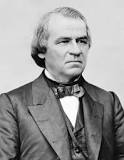 June 5, 2019 (Wednesday)
June 5, 2019 (Wednesday)
Andrew Johnson was the only president ever impeached until the impeachment of Bill Clinton. (Richard Nixon resigned as he faced threats of impeachment). Neither man was convicted by the Senate. In both instances, politics played a part in the impeachment and the outcome.
During Lincoln’s first term, 1861-1865, Hannibal Hamlin was the vice president. When Lincoln was re-elected in 1865, Andrew Johnson had the job. Lincoln was shot soon after his inauguration on April 14 and died on April 15. Johnson then became president.
 Andrew Johnson (December 29, 1808 – July 31, 1875) was the 17th president of the United States, serving from April 15, 1865 to March 4, 1869.
Andrew Johnson (December 29, 1808 – July 31, 1875) was the 17th president of the United States, serving from April 15, 1865 to March 4, 1869.
He was born in Raleigh, North Carolina, on December 29, 1808, to a very poor family. He was raised in a two-room shack by poor and illiterate parents. His father died when he was three years old. His mother was a laundress. She had him and his older brother apprenticed to a tailor when he was ten and legally bound until age 21. After 5 years, they both ran away and became hunted fugitives. He moved around and eventually settled in Greenville, Tennessee, where he set up a successful tailoring business in the front of his home. In 1827, at the age of 18, he married 16-year-old Eliza McCardle, the daughter of a local shoemaker. Though she suffered from Tuberculosis, Eliza supported her husband’s endeavors. She taught him mathematics skills and tutored him to improve his writing. She usually remained in Greeneville during Johnson’s political rise. She was not often seen during her husband’s presidency; their daughter Martha usually served as official hostess.
Johnson’s tailoring business prospered during the early years of the marriage, enabling him to hire help and giving him the funds to invest profitably in real estate. He was a voracious reader and interested in politics.
In 1835, he ventured into county politics and was elected to an office. He joined the Tennessee militia and became a colonel. He was elected to the state legislature, became an advocate for his party, and built a powerful political machine in his county. He was an excellent public speaker and people flocked to hear him. He became wealthy and influential and was elected to the Tennessee Senate in 1841, sold his business and concentrated on politics. He was elected to the U.S. House of Representatives and served from 1843 to 1853, when he became governor of Tennessee for four years. In 1857, he was elected to the U.S. Senate. (He had hoped to be nominated for president).
He was a popular man (someone wrote of him, “Johnson was always the same to everyone … the honors heaped upon him did not make him forget to be kind to the humblest citizen.”
Johnson hoped that he would be a compromise candidate in the 1860 election for the presidential nomination as the Democratic Party tore itself apart over the slavery question. After Lincoln’s election, southern representatives and senators resigned their offices if their states had seceded. Johnson passionately defended the position of remaining in office regardless. He was the only member from a seceded state to remain in the Senate and the most prominent Southern Unionist. He had Lincoln’s ear. In 1862 Lincoln appointed him as Military Governor of Tennessee, with the rank of Brigadier General. In the 1864 election, Lincoln chose Johnson as vice presidential candidate, over Hannibal Hamlin, who had served in that office during Lincoln’s first term.
Lincoln was shot by an assassin on April 14, 1865 and Johnson was sworn in as president on April 15, after Lincoln’s death. In all fairness, he faced an impossible situation, given the chaos in America left in place by the Civil War, Reconstruction plans, politics confused by secessions, issues related to emancipation, etc. etc. Politics, plain and simple, brought about Johnson’s impeachment, but he was not convicted by the senate. (Please read the Wikipedia article about Andrew Johnson for greater details concerning his impeachment).
In 1869, Johnson’s term ended and Ulysses S. Grant, Civil War hero, became president.
Seeking vindication for himself, and revenge against his political enemies, he launched a Senate bid soon after returning home to Tennessee. He became a U.S. Senator in his second attempt in 1875, and remains the only ex-president to serve as senator. Johnson’s story has a miraculous quality to it: the poor boy who systematically rose to the heights, fell from grace, and then fought his way back to a position of honor in the country. For good or ill, ‘only in America,’ as they say, could Johnson’s story unfold in the way that it did. (quoted from Wikipedia). He died at age 66 on July 30, 1875.
Please read the Wikipedia article about Andrew Johnson for greater details concerning his impeachment.
